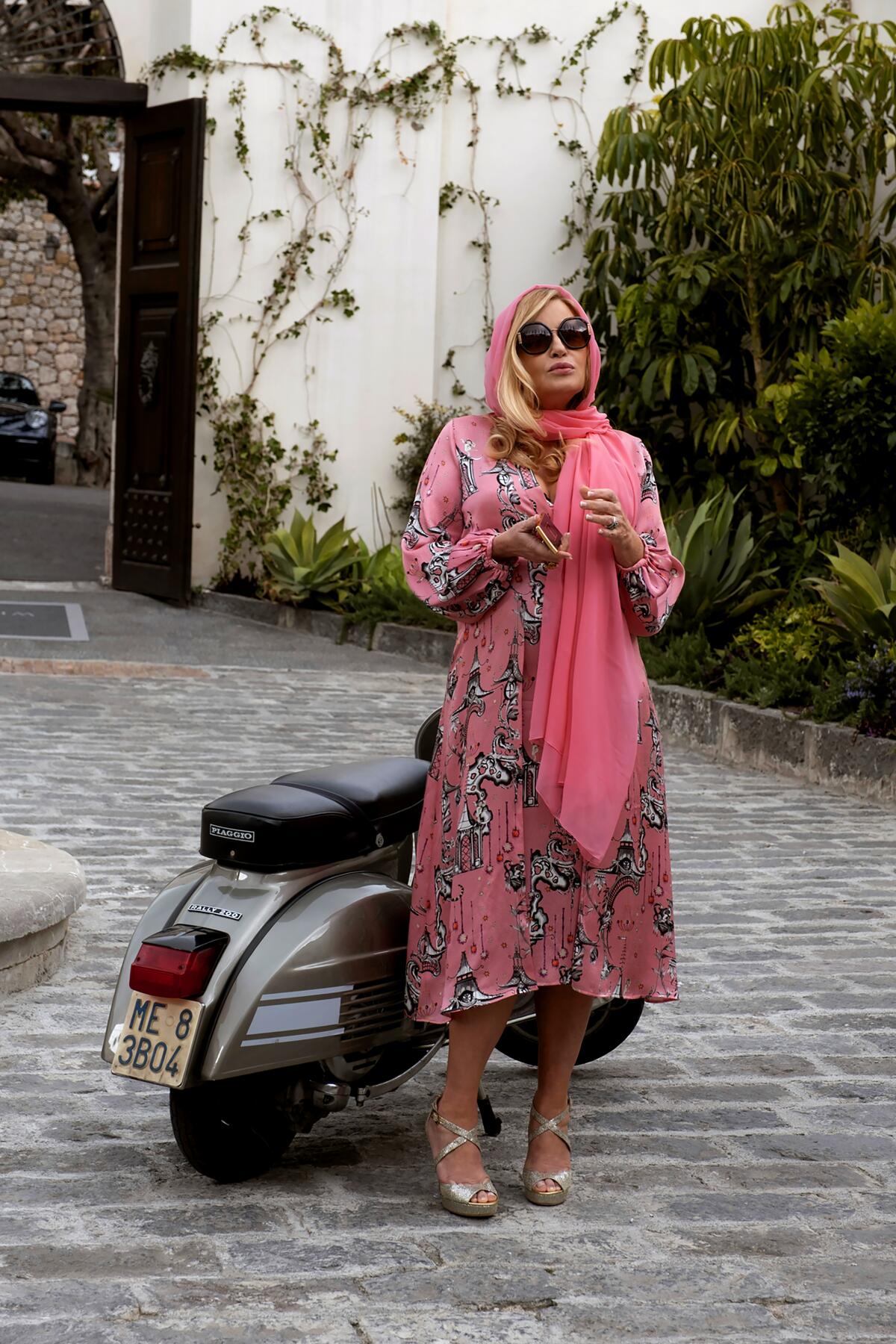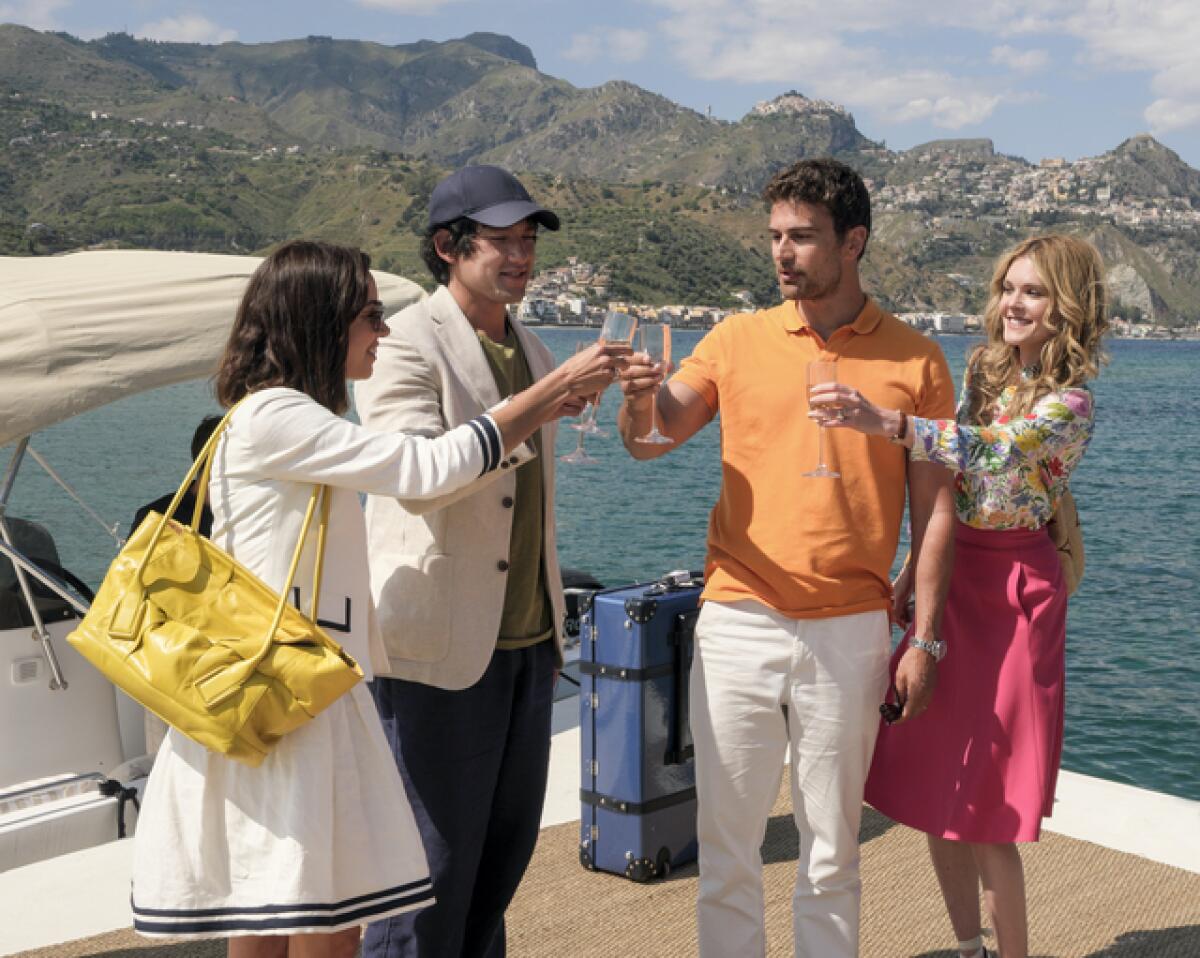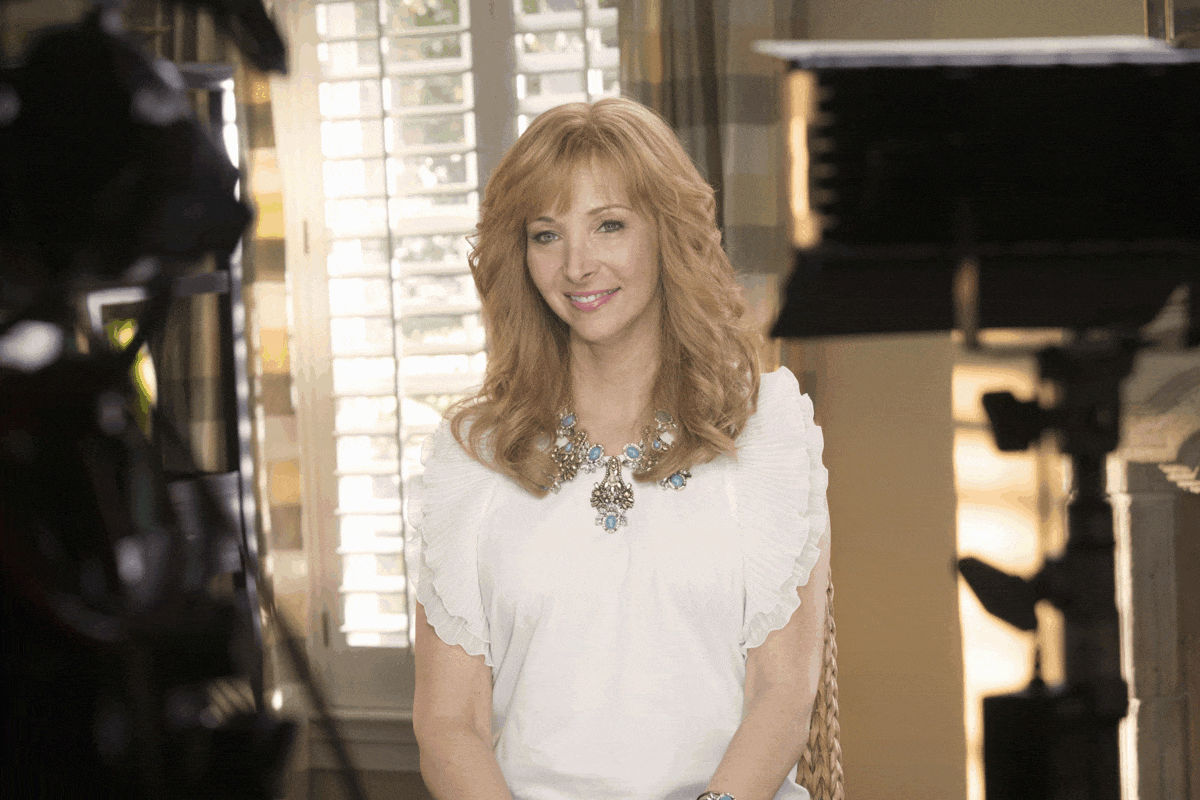‘The White Lotus’ returns for Season 2, slowed down and sexed up

- Share via
Mike White’s sorrows-of-the-rich comedy “The White Lotus” returns Sunday to HBO with a second season, set in Sicily. The first won some Emmys, for limited or anthology series, for White as a writer and director and for actors Jennifer Coolidge and Murray Bartlett. The tissue connecting that year and this is the eponymous White Lotus, a worldwide luxury hotel chain, and the presence of Coolidge, back as Tanya.
Like the first season, the second begins with an unidentified dead body before jumping back a week. Here, in a scene that plays like a tip of the fin to “Jaws,” a guest of the hotel is found drowned just off the beach. (It’s suggested that there may have been “a few” more.) This injects mystery into the story — not a murder mystery, necessarily, since we don’t know if murder is involved, or, for that matter, if the body or bodies belong to anyone in the main cast. As only five of seven episodes were offered for review, I have no idea — but, you know, probably murder and probably someone we know.
It’s easy enough to forget this future fatality, once you’re in the meat of the tangentially connected stories, especially since nothing in those first five episodes is setting you up for a death. None of the principals seems at all a danger to others or themselves, however poorly they get along or whatever darkness they might hold inside, or however much the viewer might want to do away with one or two himself.
As before, the guests arrive by boat — a bit of a classic mystery trope — allowing us to meet most everyone at once. Michael Imperioli is Dominic, a Hollywood something or other, taking his father, Bert (F. Murray Abraham), and son, Albie (Adam DiMarco), to visit the village where his grandparents were born. Aubrey Plaza and Will Sharpe are Harper and Ethan, a married couple, traveling at the invitation of his old college roommate, Cameron (Theo James), and Cameron’s wife, Daphne (Meghann Fahy). And there is Coolidge’s Tanya, now with an assistant, Portia (Haley Lu Richardson) in tow; husband Greg (Jon Gries), whom she met in Season 1, has arrived before her. Greg, claiming Portia’s presence will interfere with what is supposed to be a romantic vacation, demands that Tanya send her away; Tanya insists that she stay close: “Because I might need you. But lay low, and don’t come out of your room.”
“The White Lotus” ably mocks the wealthy patrons of a tropical resort. Its knives would have been even sharper if it had spent more time on the staff.
Awaiting them at the dock are the martinet of a hotel manager, Valentina (Sabrina Impacciatore), and her staff, putting on an air of practiced friendliness. (“Greet them together with the same right hand,” she orders, as they wave in unison). Watching from afar are Lucia (Simona Tabasco), a sex worker who has a date arranged with one of the guests — she doesn’t know him by sight, but you’ll have no trouble guessing — and her friend Mia (Beatrice Grannò), who wants to be a singer. Later in the series, we’ll meet Tom Hollander as Quentin (named for Crisp, I’d wager), an Englishman who has a yacht and lives in an inherited villa in Palermo, along with his visiting nephew, Jack (Leo Woodall).
The new season feels busier yet less mad than its predecessor; the action doesn’t stick hermetically to the hotel, the bigger canvas amplifying the series’ touristic appeal. Where the Hawaii story gave us humans determined to relax making a hell of paradise, here the characters have come for fun and adventure, not to find themselves but possibly to find others. (Except for Harper, who finds none of it appealing.) The new environment ejects some intensity and speed into the proceedings. There are jet skis. Wanting to feel like Monica Vitti, Tanya orders up a Vespa.

As in Italian comedies of the Marcello Mastroianni and Sophia Loren era, sex is very much on the menu, but also sex as it relates, or doesn’t, to love. Some characters have it; all of them talk about it. (One might call this a dark romp.) Bert flirts with any attractive young woman close enough to hear him, much to the consternation of Albie, who can’t even picture people having sex after 50. Albie, who has grown up in a more sensitive era, does not want to turn out like his philandering father, whose marriage is all but over, or his grandfather; yet being respectful has never worked for him. He develops a liking for Portia, who had hoped to “get thrown around by some hot Italian guy.” Cameron, recalling their college days, calls Ethan “the original incel.”
Harper and Ethan, who cannot sync up their sex drives, read in bed while Cameron tickles (not a euphemism) Daphne next door. But is the outwardly happy couple inwardly troubled? Is the seemingly less happy pair fundamentally content? (“They seem happy,” says Ethan, to which Harper replies, “No way. It’s a front.”) Temperamental opposites, the two couples face each other warily (Harper, the wariest of all), as in a satirical millennial “Who’s Afraid of Virginia Woolf?”
People who have nothing else to talk about will often talk about television. (It’s the new weather.) “I love it,” Daphne says of the true-crime show “Dateline,” possibly foreshadowing the death ahead, or just serving up a red herring to go with the Prosecco. “Husbands murdering their wives. Happens a lot on vacation. Scuba diving. He’ll just unplug her oxygen while she’s underwater. Happens more than you think.”
We surveyed The Times TV team to come up with a list of the 75 best TV shows you can watch on Max (formerly HBO Max). And yes, your disagreement is duly noted.
For all the goings on, the first five episodes don’t exactly build up a narrative head of steam. It’s hard to tell where any of these stories are heading, or if they’re heading anywhere. That’s not a criticism, exactly; it’s easy enough to hang out here, with the actors and the scenery, and the series is not without a subtle sort of movement. Characters who seem as easy to classify as Col. Mustard and Miss Scarlet grow more rounded as layers are peeled away and small risks taken. For a few of them at least, change seems possible; they turn into people. As the seemingly shallow Daphne, the uptight Harper and the single-minded Lucia, Fahy, Plaza and Tabasco profit greatly from this strategy; they’re performances to watch, among a wealth of watchable performances. (The women are far more compelling than the men.) Still, one would expect the final two episodes to bring the revelations and accelerations necessary to get the series to the end that is in its beginning. And whole movies do take place in the time remaining.
Then there is Coolidge, in another big, complicated performance. Tanya is a needy middle-aged child who remains weirdly lovable because, while blind to others’ feelings — she does tend to be polite, even when she’s being demanding — she is something of a victim herself, unable to see past her own pain, which she masks from herself with illusions of contentment. Her contradictions — and what Coolidge does with them — make her funny, if in a sort of horrifying way. It’s not hard to see why the presumably happy ending she found at the end of Season 1 with Greg (terminally ill then, not terminated now) seems to have gone sour.
Reviewing the Hawaii-set first season, my fellow critic Lorraine Ali pointed out that while White was presumably interested in issues of colonialism and capitalism, little real attention was paid to the native staff. Apart from Valentina and Lucia and Portia, exploiters or exploited each in her own way, workers are largely disposable here, as anonymous and invisible as I would guess the staff at such a place would be. Money is definitely a subject; there are characters for whom it is no object, and characters who have, relatively speaking, none. (“It’s a good feeling when you realize that someone has money,” says Tanya, “‘cause then you don’t have to worry about them wanting yours.”) Regarding the glittery Cameron and Daphne, who have tuned out the global emergencies that keep Harper from sleep, she asks Ethan, “Is that what happens when you’re rich for too long, your brain just atrophies?” (Ethan’s wealth, from the sale of a company, is new and not yet toxic.)
But in another way, wealth is beside the point. These people are merely rich like Fred and Ginger in soundstage Venice, or Bertie Wooster in P.G. Wodehouse, or the suspect-guests in an Agatha Christie country-house mystery; it’s the price of being characters in this series. Money can’t buy happiness and so what? A thriving neighborhood of television is devoted to what it can buy — what the rich eat and wear, where they live and party and relax. As negatively as I react to anything that comes with the word “luxury” attached — “exclusive” just makes it worse — I can’t deny that the settings of “The White Lotus” are pretty to behold. Still, I was more than a little happy when Valentina stopped into an ordinary local cafe for a shot of espresso. That is my vacation dream.
‘The White Lotus’
Where: HBO
When: Sunday, 9 p.m.
Streaming: HBO Max, any time starting Sunday
Rating: TV-MA (may be unsuitable for children under the age of 17)
More to Read
The complete guide to home viewing
Get Screen Gab for everything about the TV shows and streaming movies everyone’s talking about.
You may occasionally receive promotional content from the Los Angeles Times.








